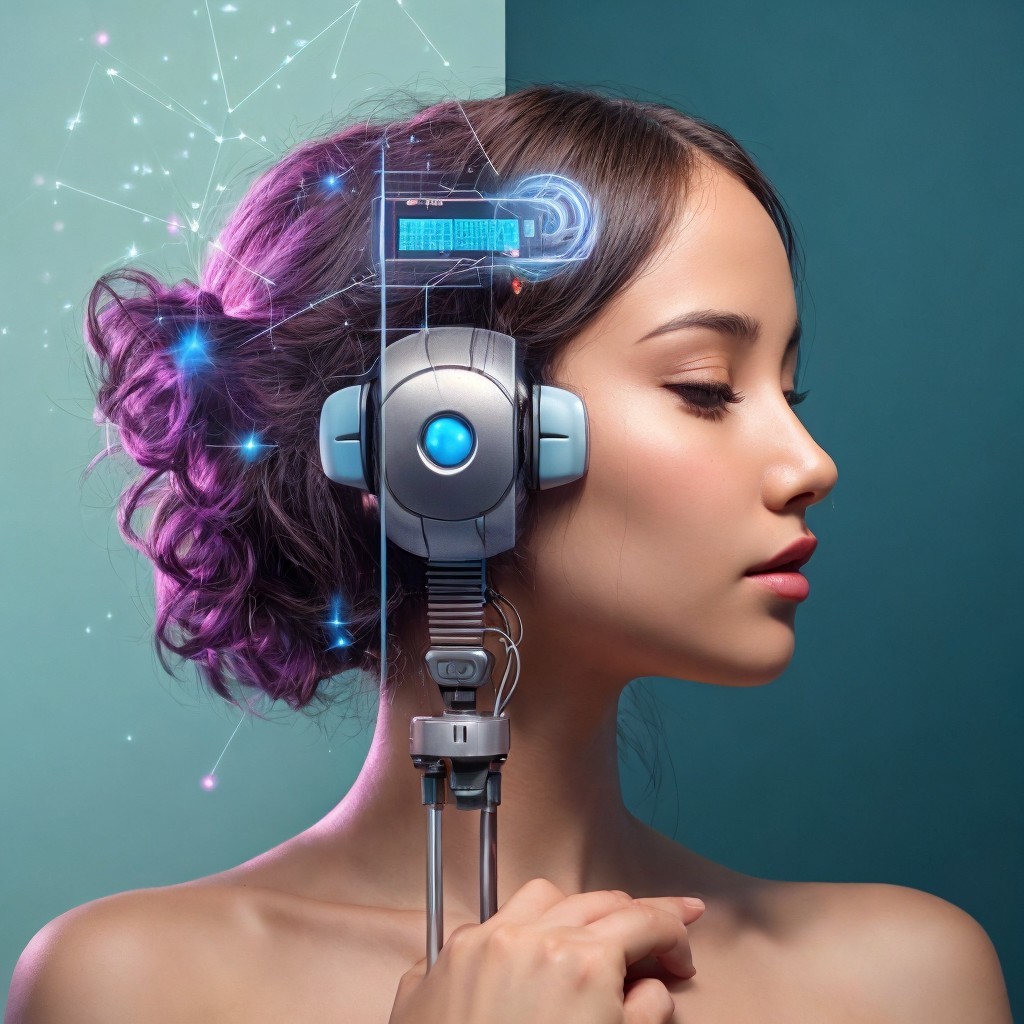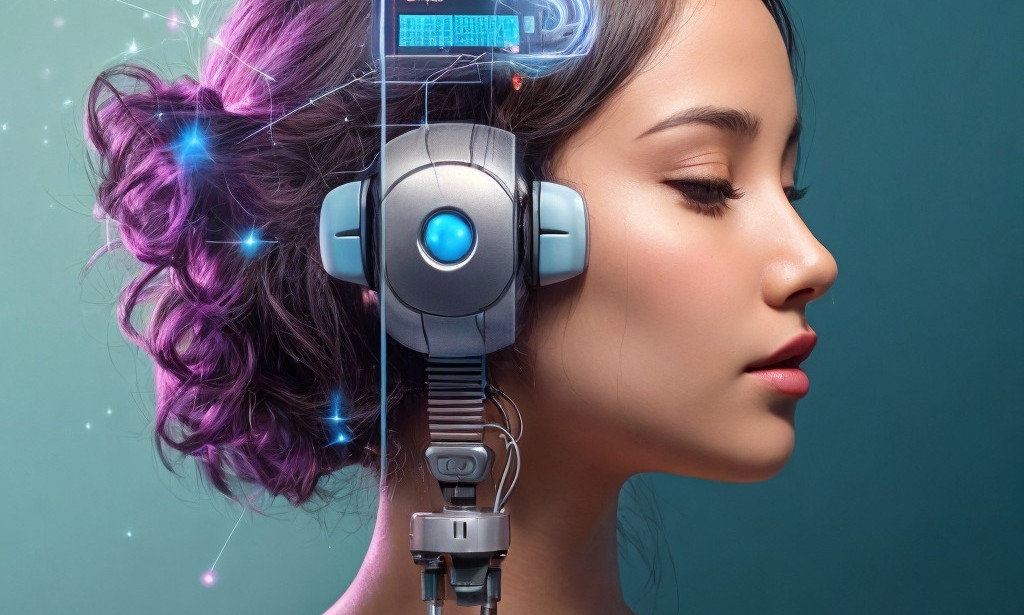
Have you ever woken up from a weird dream and wondered what it all meant? Maybe you dreamed about flying, falling, or being chased by a giant marshmallow man. We've all been there, scratching our heads and trying to make sense of these strange night-time stories our brains cook up. Well, guess what? There's a new kid on the block when it comes to figuring out our dreams: Artificial Intelligence, or AI for short.
Yep, you heard that right. The same kind of tech that helps your phone recognize your face is now diving into the world of dreams. But what does AI have to do with our nightly adventures in dreamland? And how can computers possibly help us understand something as personal and weird as our dreams? Buckle up, dream explorers, because we're about to take a wild ride through the fascinating world of AI dream interpretation!
Have an interesting dream to share? Join Questmist to document your dreams, get expert interpretations, and connect with a community of dreamers — Register Now or Login to begin your journey!
Don’t forget to try Questmist’s AI dream interpreter—click here to interpret your dreams!
What's the Deal with Dreams Anyway?
Before we jump into how AI is shaking things up, let's talk about dreams for a sec. We all have them, but they're still pretty mysterious. Some folks think dreams are just our brains taking out the trash, sorting through the day's events. Others believe dreams have deep meanings and can tell us important stuff about ourselves.
For ages, people have been trying to figure out what dreams mean. From ancient cultures believing dreams were messages from the gods, to Freud thinking they were all about our secret desires, humans have always been curious about their nighttime stories.
These days, dream interpretation is a mix of art and science. Some people swear by dream dictionaries, while others prefer talking to a therapist about their dreams. But now, there's a new player in the game: AI dream interpretation. And it's starting to change how we think about our dreams in some pretty cool ways.
What's AI Dream Interpretation All About?
Okay, so what exactly do we mean when we talk about AI interpreting dreams? It's not like you can just tell Siri about your dream and get an instant answer (at least, not yet!). AI dream interpretation is all about using smart computer programs to help us make sense of our dreams.
These AI programs are like super-smart detectives. They can look at tons of information about dreams and dreaming, spot patterns that we humans might miss, and use all that knowledge to help figure out what our individual dreams might mean.
But how does it actually work? Let's break it down:
-
Gathering Dream Data: First, the AI needs to learn about dreams. It does this by looking at loads of information from dream journals, sleep studies, and even brain scans of people while they're dreaming.
-
Finding Patterns: Next, the AI looks for patterns in all this dream data. It might notice that lots of people dream about flying when they're feeling free or happy, for example.
-
Making Connections: The AI can then connect these patterns to other information, like what's going on in someone's life or how they're feeling.
-
Interpreting New Dreams: When someone shares a new dream, the AI can use all this learned information to suggest what it might mean.
It's like having a super-smart friend who's read every book about dreams ever written and can remember it all perfectly!
The Ups of Using AI for Dream Interpretation
So why bother using AI to interpret dreams? Well, there are some pretty cool reasons:
1. It's Super Fast
Imagine trying to read through thousands of books about dreams to figure out what yours might mean. It would take forever! AI can do this kind of thing in seconds. It's like having the world's fastest librarian working just for you.
2. It Never Gets Tired
Let's face it, even your best friend might get a bit bored if you tell them about every single dream you have. AI doesn't get bored or tired. It can look at as many dreams as you want, any time you want.
3. It Can Spot Things We Might Miss
Sometimes, we're too close to our own lives to see patterns in our dreams. AI can look at things more objectively and might notice connections we've overlooked.
4. It's Always Learning
The more dreams AI looks at, the better it gets at understanding them. It's like it's always in school, learning new things about dreams all the time.
5. It Can Handle Loads of Information
Our dreams can be affected by all sorts of things - what we ate, what we watched on TV, how we're feeling. AI can keep track of all these factors and how they might influence our dreams.
The Downs of AI Dream Interpretation
Of course, it's not all sunshine and rainbows. There are some downsides to using AI for dream interpretation too:
1. It's Not Human
AI might be smart, but it's not human. It can't understand the emotional side of dreams the way a person can. It might miss out on personal or cultural meanings that are important to you.
2. Dreams Are Complicated
Dreams are weird and wonderful things. They're not always logical, and they can mean different things to different people. AI might struggle with this complexity.
3. Privacy Concerns
To interpret your dreams, AI needs to know about them. Some people might not feel comfortable sharing such personal information with a computer program.
4. It's Still New
AI dream interpretation is a pretty new field. We're still figuring out how well it works and how to use it best.
5. It Might Miss Cultural Context
Dreams can mean different things in different cultures. An AI might not always understand these cultural differences, which could lead to misinterpretations.
How AI is Changing the Dream Game
Even with these drawbacks, AI is shaking things up in the world of dream interpretation. Here's how:
1. Making it More Accessible
Not everyone can afford to see a professional dream interpreter or therapist. AI tools could make dream interpretation available to more people, anytime, anywhere.
2. Providing New Insights
AI can analyze way more dreams than any human could. This might lead to new discoveries about what dreams mean and why we have them.
3. Combining with Other Technologies
Imagine if AI could interpret your dreams based on your brain activity while you sleep. Or if it could create images of your dreams based on your description. This kind of tech is already being developed!
4. Personalizing Interpretations
As AI learns more about you and your dreams over time, it could provide more personalized interpretations. It's like having a dream interpreter who really knows you.
5. Helping with Mental Health
Our dreams can say a lot about our mental health. AI might help spot signs of things like depression or anxiety in our dreams, potentially helping with early diagnosis and treatment.
The Future of AI and Dreams
So what's next for AI and dream interpretation? Here are some exciting possibilities:
1. Dream Prediction
Could AI one day predict what we'll dream about based on what's happening in our lives? Some researchers think so!
2. Dream Control
There's a thing called "lucid dreaming" where people can control their dreams. Could AI help more people learn how to do this?
3. Better Sleep
By understanding our dreams better, AI might help us get better sleep overall. It could potentially help with issues like nightmares or insomnia.
4. Dream-Based Learning
Some scientists think we might be able to learn things while we sleep. Could AI help design dreams that could teach us new skills or languages?
5. Virtual Reality Dreams
Imagine being able to "replay" your dreams in virtual reality, or share them with friends. AI could potentially help create visual representations of our dreams.
How to Use AI for Dream Interpretation
Interested in trying out AI dream interpretation for yourself? Here are some tips:
-
Keep a Dream Journal: Write down your dreams as soon as you wake up. The more detail, the better!
-
Try Different Apps: There are several AI dream interpretation apps out there. Try a few to see which you like best.
-
Be Open-Minded: Remember, AI interpretations are suggestions, not absolute truths.
-
Compare with Your Own Thoughts: See how the AI's interpretation compares with what you think your dream means.
-
Look for Patterns: Over time, see if you notice any patterns in your dreams or the AI's interpretations.
-
Use it as a Starting Point: Use AI interpretation as a jumping-off point for your own reflection and analysis.
-
Combine with Other Methods: Don't rely solely on AI. Consider combining it with traditional dream interpretation methods or talking to a therapist.
The Science Behind AI Dream Interpretation
Now, let's get a bit nerdy for a moment (but don't worry, we'll keep it simple!). How does AI actually learn to interpret dreams?
It all comes down to something called machine learning. Basically, we feed the AI tons of information about dreams - what people dream about, what was happening in their lives at the time, how they felt about the dream, and so on.
The AI then uses fancy math (algorithms) to spot patterns in all this data. For example, it might notice that people often dream about teeth falling out when they're worried about their appearance.
As the AI looks at more and more dreams, it gets better at spotting these patterns. It's kind of like how you get better at spotting constellations the more you look at the night sky.
But here's the cool part: AI can spot patterns that humans might miss. It might notice tiny details that connect dreams in ways we never thought of before.
Of course, it's not perfect. Dreams are super personal and complicated. But AI is getting better all the time at understanding the weird and wonderful world of our dreams.
Real-Life Examples of AI Dream Interpretation
So, what does AI dream interpretation look like in real life? Let's look at a couple of examples:
Example 1: The Flying Dream
Sarah often dreams about flying. She tells an AI dream interpreter about her latest flying dream, where she soared over her childhood home.
The AI might say something like: "Dreams about flying often represent feelings of freedom or success. Flying over your childhood home could mean you're looking at your past from a new perspective. Have you recently overcome a challenge or achieved a goal?"
Sarah realizes she just got a promotion at work, which could explain the feeling of success in her dream.
Example 2: The Chased Dream
Mike keeps having dreams where he's being chased by a shadowy figure. He's never able to see who's chasing him, but he always wakes up feeling scared.
An AI dream interpreter might suggest: "Being chased in dreams often reflects anxiety or feeling pressured in your waking life. The fact that you can't see who's chasing you might mean the source of your stress isn't clear. Is there something in your life that's making you feel overwhelmed or threatened?"
This interpretation helps Mike realize he's been stressed about an upcoming deadline at work, even though he hadn't consciously acknowledged it.
Ethical Considerations of AI Dream Interpretation
As cool as AI dream interpretation is, it does raise some important questions:
-
Privacy: How do we make sure our very personal dream data is kept safe?
-
Accuracy: How can we be sure the AI's interpretations are reliable?
-
Overreliance: Could people start relying too much on AI interpretations instead of their own intuition?
-
Cultural Sensitivity: Can AI accurately interpret dreams from different cultures?
-
Mental Health Implications: What if AI spots signs of mental health issues in someone's dreams? How should that be handled?
These are big questions that scientists, ethicists, and developers are still grappling with. As AI dream interpretation becomes more common, we'll need to find good answers to these questions.
FAQs About AI Dream Interpretation
Still have questions? Don't worry, you're not alone! Here are some common questions people ask about AI dream interpretation:
-
Q: Can AI really understand my dreams?
A: AI can spot patterns and make connections, but it can't understand dreams exactly like a human would. It's a tool to help you understand your dreams, not a mind reader. -
Q: Is AI dream interpretation accurate?
A: It can provide interesting insights, but dream interpretation isn't an exact science. Always use your own judgment too. -
Q: Do I need to know about AI to use these tools?
A: Nope! Most AI dream interpretation tools are designed to be user-friendly. -
Q: Is it safe to share my dreams with an AI?
A: Make sure to read the privacy policy of any app you use. Some might use your data to improve their AI, so be aware of that. -
Q: Can AI interpret dreams from different cultures?
A: This is a tricky one. AI is getting better at understanding cultural differences, but it might still miss some important cultural meanings in dreams. -
Q: Will AI replace human dream interpreters?
A: It's unlikely. While AI can be a helpful tool, many people still prefer talking to a human about their dreams. -
Q: How often should I use AI dream interpretation?
A: It's up to you! Some people like to check every dream, while others only use it for dreams that really puzzle them. -
Q: Can AI help with nightmares?
A: AI might help you understand why you're having nightmares, but if they're causing you distress, it's best to talk to a healthcare professional. -
Q: Are there any risks to using AI for dream interpretation?
A: The main risks are around privacy and the possibility of misinterpretation. Always use AI interpretations as a starting point, not the final word. -
Q: How much does AI dream interpretation cost?
A: It varies. Some apps are free, while others charge a fee. Always check the pricing before you start using a service.
Wrapping It Up: The Dream Team of AI and You
So there you have it – the lowdown on AI dream interpretation. It's a pretty exciting field that's changing how we think about our night-time adventures. But remember, at the end of the day (or night), you're the expert on your own dreams. AI can be a super helpful tool, but it's just that – a tool. It's there to help you understand your dreams better, not to replace your own thoughts and feelings.
Whether you're a dream interpretation newbie or you've been trying to figure out your dreams for years, AI offers a new and interesting way to explore your subconscious. It's like having a really smart friend who's always ready to chat about your dreams.
But the most important thing is to have fun with it! Dreams are weird and wonderful, and exploring them should be an adventure. Maybe AI will help you unlock some amazing insights about yourself. Or maybe it'll just give you a good laugh when it tries to explain that dream about riding a unicorn through a sea of jello.
So next time you wake up wondering, "What was that all about?", maybe give AI a try. It might just help you see your dreams in a whole new light. And who knows? You might learn something new about yourself along the way.
Sweet dreams, and happy interpreting!
For more about AI dream interpretation, check out Questmist AI Dream Interpreter. Happy dreaming!


You must be logged in to post a comment. Please Login or Register .